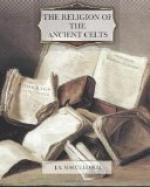[722] Reinach suggests that this may explain why Vercingetorix, in view of siege by the Romans, sent away his horses. They were too sacred to be eaten. Caesar, vii. 71; Reinach, RC xxvii. 1 f.
[723] Juvenal, viii. 154; Apul. Metam. iii. 27; Min. Felix, Octav. xxvii. 7.
[724] For the inscriptions, see Holder, s.v. “Epona.”
[725] CIL iii. 7904.
[726] CIL xiii. 3071; Reinach, BF 253, CMR i. 64, Repert. de la Stat. ii. 745; Holder, ii. 651-652.
[727] Granger, Worship of the Romans, 113; Kennedy, 135.
[728] Grimm, Teut. Myth. 49, 619, 657, 661-664.
[729] Frazer, Golden Bough{2}, ii. 281, 315.
[730] Caesar, v. 21, 27. Possibly the Dea Bibracte of the Aeduans was a beaver goddess.
[731] O’Curry, MC ii. 207; Elton, 298.
[732] Girald. Cambr. Top. Hib. ii. 19, RC ii. 202; Folk-Lore, v. 310; IT iii. 376.
[733] O’Grady, ii. 286, 538; Campbell, The Fians, 78; Thiers, Traite des Superstitions, ii. 86.
[734] Lady Guest, ii. 409 f.
[735] Blanchet, i. 166, 295, 326, 390.
[736] See p. 209, supra.
[737] Diod. Sic. v. 30; IT iii. 385; RC xxvi. 139; Rh[^y]s, HL 593.
[738] Man. Hist. Brit. p. x.
[739] Herodian, iii. 14, 8; Duald MacFirbis in Irish Nennius, p. vii; Caesar, v. 10; ZCP iii. 331.
[740] See Reinach, “Les Carnassiers androphages dans l’art gallo-romain,” CMR i. 279.
[741] See Holder, s.v.
[742] Rh[^y]s, CB{4} 267.
[743] Caesar, v. 12.
[744] Dio Cassius, lxii. 2.
[745] See a valuable paper by N.W. Thomas, “Survivance du Culte des Animaux dans le Pays de Galles,” in Rev. de l’Hist. des Religions, xxxviii. 295 f., and a similar paper by Gomme, Arch. Rev. 1889, 217 f. Both writers seem to regard these cults as pre-Celtic.
[746] Gomme, Ethnol. in Folklore, 30, Village Community, 113.
[747] Dio Cass. lxxii. 21; Logan, Scottish Gael, ii. 12.
[748] Joyce, SH ii. 529; Martin, 71.
[749] RC xxii. 20, 24, 390-1.
[750] IT iii. 385.
[751] Waldron, Isle of Man, 49; Train, Account of the Isle of Man, ii. 124.
[752] Vallancey, Coll. de Reb. Hib. iv. No. 13; Clement, Fetes, 466. For English customs, see Henderson, Folklore of the Northern Counties, 125.
[753] Frazer, Golden Bough{2}, ii. 380, 441, 446.
[754] For other Welsh instances of the danger of killing certain birds, see Thomas, op. cit. xxxviii. 306.
[755] Frazer, Kingship, 261; Stokes, RC xvi. 418; Larminie, Myths and Folk-tales, 327.




